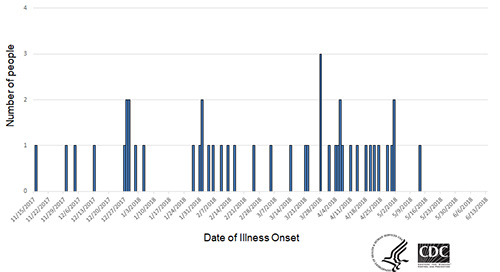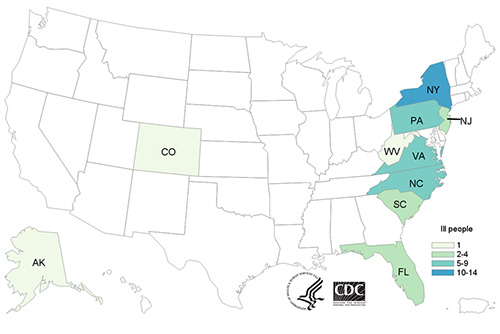2018 Salmonella Braenderup Infections Linked to Rose Acre Farms Shell Eggs (Final Update)
Posted July 26, 2018 11:30 AM ET
This outbreak appears to be over. Consumers and restaurants should always handle and cook eggs safely to avoid foodborne illness from raw eggs. Wash hands and items that came into contact with raw eggs with soap and water.
- As of June 14, 2018, this outbreak appears to be over.
- CDC, public health and regulatory officials in several states, and the U.S. Food and Drug Administration (FDA) investigated a multistate outbreak of Salmonella Braenderup infections linked to Rose Acre Farms shell eggs.
- Forty-five people infected with the outbreak strain of Salmonella Braenderup were reported from 10 states.
- Eleven people were hospitalized, and no deaths were reported.
-
Epidemiologic, laboratory, and traceback evidence indicated that shell eggs produced by Rose Acre Farms’ Hyde County, North Carolina farm were the likely source of this multistate outbreak.
- On April 13, 2018, Rose Acre Farms of Seymour, Indiana, voluntarily recalled 206,749,248 shell eggs because they could have been contaminated with Salmonella bacteria. Visit the FDA website for a list of recalled products.
- On April 16, 2018, Cal-Maine Foods, Inc. voluntarily recalled 23,400 dozen eggs purchased from Rose Acre Farms.
- Consumers and restaurants should handle and cook eggs safely to avoid foodborne illness from raw eggs. It is important to handle and prepare all fresh eggs and egg products carefully.
- Eggs should be cooked until both the yolk and white are firm. Scrambled eggs should not be runny.
- Wash hands and items that came into contact with raw eggs—including countertops, utensils, dishes, and cutting boards—with soap and water.
- Wash and sanitize drawers or shelves in refrigerators where recalled eggs were stored. Follow these five steps to clean your refrigerator.
Introduction
CDC, public health and regulatory officials in several states, and the U.S. Food and Drug Administration (FDA) investigated a multistate outbreak of Salmonella Braenderup infections.
Public health investigators used the PulseNet system to identify illnesses that were part of this outbreak. PulseNet is the national subtyping network of public health and food regulatory agency laboratories coordinated by CDC. DNA fingerprinting is performed on Salmonella bacteria isolated from ill people by using techniques called pulsed-field gel electrophoresis (PFGE) and whole genome sequencing (WGS). CDC PulseNet manages a national database of these DNA fingerprints to identify possible outbreaks. WGS gives a more detailed DNA fingerprint than PFGE.
As of June 13, 2018, 45 people infected with the outbreak strain of Salmonella Braenderup were reported from 10 states. A list of the states and the number of cases in each can be found on the Case Count Map page.
Illnesses started on dates ranging from November 16, 2017 to May 13, 2018. Ill people ranged in age from 1 to 90, with a median age of 60. Fifty-six percent were female. Eleven people were hospitalized, and no deaths were reported.
Testing of 3 clinical isolates using standard antibiotic susceptibility testing methods by CDC’s National Antimicrobial Resistance Monitoring System (NARMS) laboratory did not show any resistance. Whole genome sequencing of 27 clinical and 7 environmental isolates also did not predict resistance to antibiotics on the NARMS panel.
Investigation of the Outbreak
Epidemiologic, laboratory, and traceback evidence indicated that shell eggs produced by Rose Acre Farms’ Hyde County, North Carolina farm were the likely source of this multistate outbreak.
In interviews, ill people answered questions about the foods they ate and other exposures in the week before they became ill. Thirty (83%) of 36 people interviewed reported eating shell eggs. Nineteen (53%) reported eating various egg dishes at different restaurants. This latter percentage is significantly higher than results from a survey [PDF – 787 KB] of healthy people in which 38% of respondents reported eating any eggs away from home in the week before they were interviewed. These restaurants reported using shell eggs in the dishes eaten by ill people.
FDA traced the source of some of the shell eggs supplied to these restaurant locations to Rose Acre Farms’ Hyde County, North Carolina farm. FDA investigators inspected the farm and collected samples for testing. Laboratory testing identified the outbreak strain of Salmonella Braenderup in environmental samples taken at the farm.
On April 13, 2018, Rose Acre Farms of Seymour, Indiana, voluntarily recalled 206,749,248 shell eggs because they could have been contaminated with Salmonella bacteria. Recalled eggs were sold in grocery stores and to restaurants in Colorado, Florida, New Jersey, New York, North Carolina, Pennsylvania, South Carolina, Virginia, and West Virginia under multiple brand names, including Coburn Farms, Country Daybreak, Crystal Farms, Food Lion, Glenview, Great Value, Nelms, and Sunshine Farms. On April 16, 2018, Cal-Maine Foods, Inc. voluntarily recalled 23,400 dozen eggs purchased from Rose Acre Farms.
As of June 14, 2018, this outbreak appears to be over.


